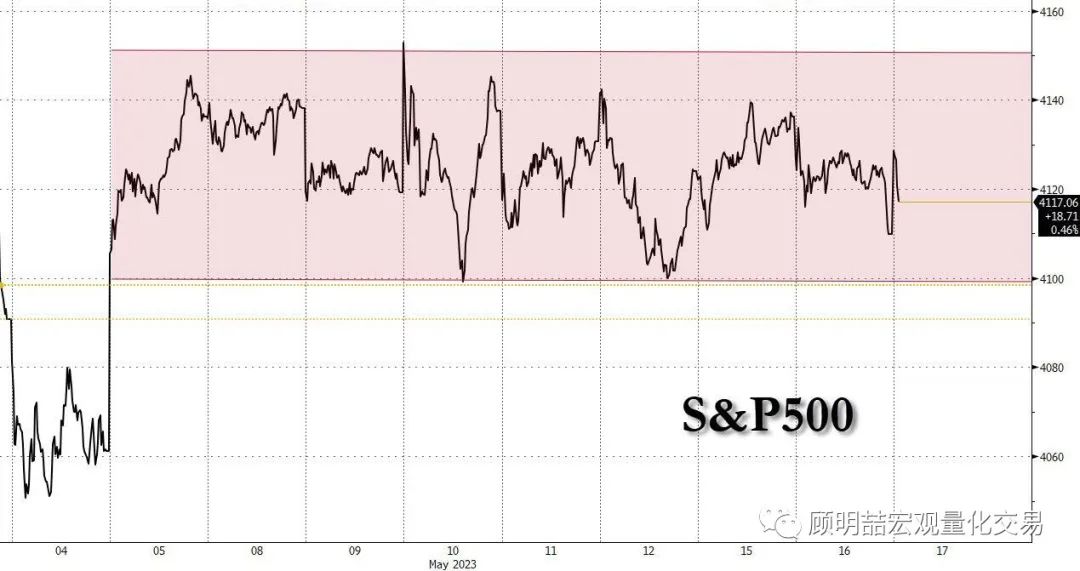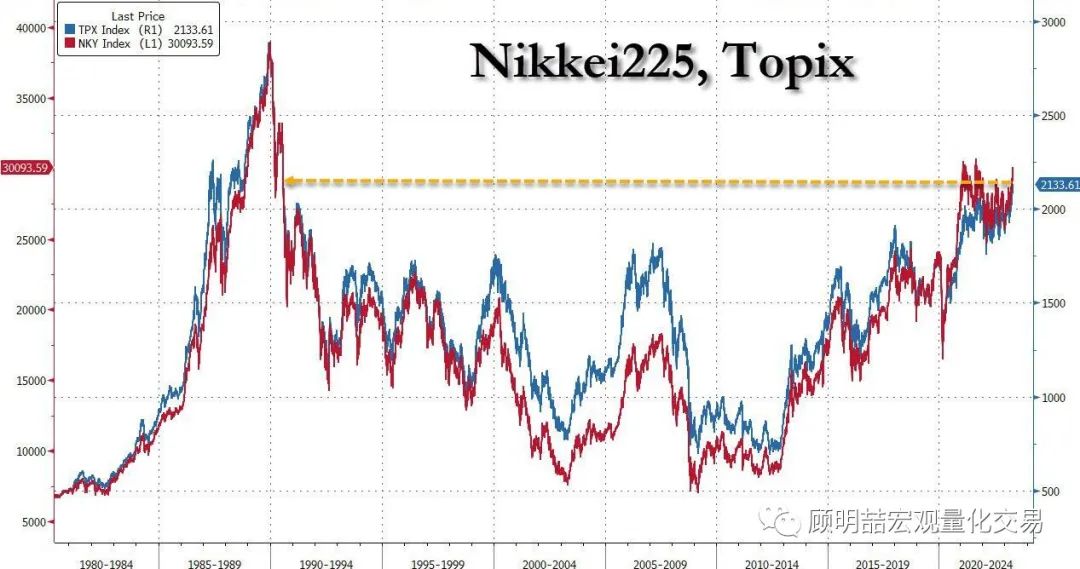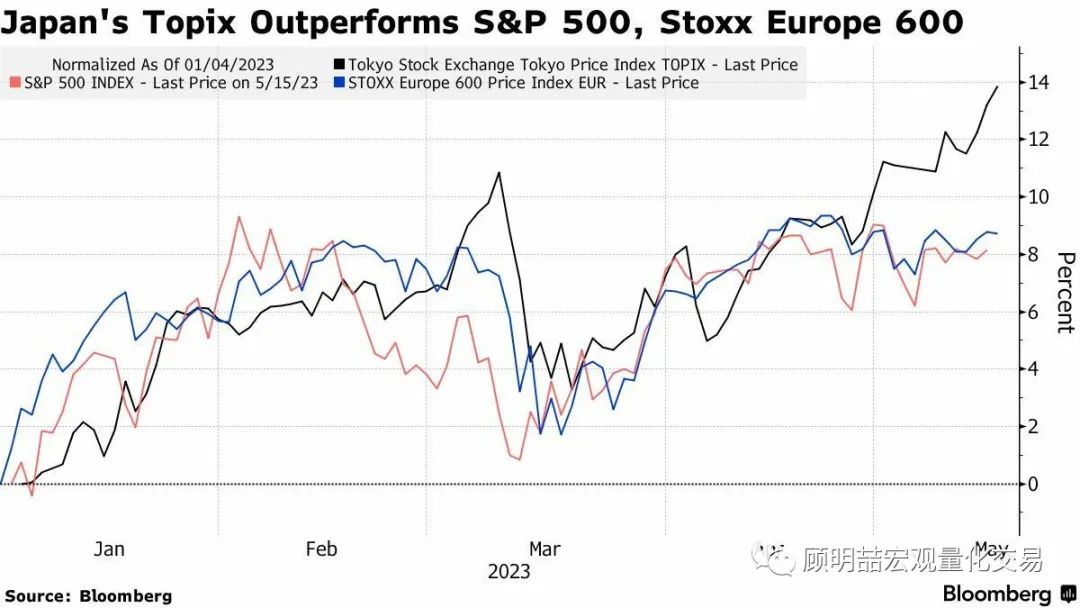Japan stocks surge to their highest since 1990,What can we expect from it?
When everyone is paying attention to the recent trend of the US stock market, or even more To be exact,As 0DTE's volatility suppression seems to permanently freeze the S&P index in the range of 4100-4150 …

... The real trend is in Japan, where the Nikkei 225 index closed above 30,000 points for the first time since September 2021, just one step away from the Tokyo Stock Price Index closing at its highest level since 1990.
On May 12, I tweeted that the Nikkei 225 Index officially started to rise, and it rose by more than 1,300 points on May 18, accurately grasping the starting point of the trend.


The Nikkei 225 index rose 0.84% to close at 30,093.59 points on Wednesday, with an increase of 7.32% this quarter. By contrast, the S&P 500 index is up less than 1% and the Stoxx Europe 600 is up less than 2%.

Japanese stock markets have been hit hard recently by false speculation that the Bank of Japan will normalize monetary policy (spoiler warning: the Bank of Japan with Treasury Bond of over 100% of GDP will never normalize, and hyperinflation has always been the lastEnding) Ueda recently confirmed that Japan will remain the loosest developed country, even if that means inflation continues to rise and they benefit from another plunge in the yen.
With the status quo not expected to change, many expect the rally to continue: Strategists at Goldman Sachs and Macquarie Group say the bull market is justified because corporate governance reforms will raise valuations and loose monetary policy will increase tailwinds. Meanwhile, price pressures are picking up in an economy long plagued by deflation as economic activity accelerates-a combination that sets it apart from the stagflation that has choked the US and developed Europe.
"We have now entered a bull market in Japan for two to three years, and that is supportive," said Neil Newman, deputy head of Japan research at Macquarie Capital Securities. . "Japan has breadth and depth, liquidity is good, and now corporate earnings look stable, which will attract further attention."
Goldman Sachs strategists Kazunori Tatebe and Bruce Kirk wrote in a note that expectations of such structural changes and solid fundamentals help "justify a bullish stance on the country's stock market." They wrote that the outlook for the world's third largest economy is strong, given positive factors such as the recovery of inbound tourism, strong capital expenditure plan and the Bank of Japan's continuous relaxation of policies.
It is a testament to how powerful loose monetary policy can be in a world where everyone is tightening, and the world's third-largest economy stands out as overseas investors worry about geopolitical risks, are unable to grasp policy changes in Beijing and are hesitant to invest in China. In the US stock market, if the influence of artificial intelligence stocks is not considered, the market has dropped by more than 2% this year.
Warren Buffett's re-endorsement of Japanese stocks has also raised hopes that foreign investment will return to the market. Overseas traders bought a net $15.8 billion worth of Japanese stocks in April, the highest level since October 2017, Tokyo Stock Exchange data showed.
"Compared with the U.S. and Europe, domestic and foreign investors are optimistic about Japan because it is not facing an imminent recession and its valuation is very low," said John Vail, chief global strategist at Nikko Asset Management Co. It has the potential to outperform global markets. "
This is not just the Bank of Japan's consistent easing policy: so is repurchase. As Bloomberg pointed out, after the Tokyo Stock Exchange called on companies trading below book value to formulate capital improvement plans, companies once again pushed for increased repurchase and focused on returns, which boosted market sentiment. Shares in Dai-Ichi Life Holdings soared Monday after the company announced plans to buy back 120 billion yen ($882 million) of shares. Mitsubishi Corp. said on May 9 that it expects to buy back up to $2.2 billion in shares.
Optimism was further boosted, because the Dongzheng index still rose by about 26% before hitting the record high of "the peak of Japan's bubble" in 1989.

Although the index has performed well, there are still doubts about when and whether it will return to its previous high. Fundamental changes in the economy over the past few decades, including a declining population and maturing industries, suggest that the days of asset price inflation are gone forever.
Still, earnings and cheap valuations, as well as the Bank of Japan's staunchly dovish stance, favor bulls. Keita Matsumoto, head of sales and solutions for financial institutions in Japan at Citi, said last month that as Bloomberg pointed out, positions in Japanese stocks are also very low, which means there is still more room for earnings.
M & amp; Fabiana Fedeli, chief investment officer of stocks and diversified assets of G Plc, said on Bloomberg TV: "We think there is still room for further gains in the Japanese stock market." "Japanese companies are improving their balance sheets and giving back to shareholders through buybacks and dividends." "Japan's performance relative to Europe and the United States has been happening and will continue as long as the Bank of Japan does not change monetary policy.
Options trading suggests that the rally may be supported. While the Nikkei 225 is up more than 14 percent this year, the put-to-call ratio is on a downward trend, suggesting that bullish sentiment is rising despite technical signals that the rally is overheating.
I think the Japanese stock market is optimistic in the medium term, and there is a risk of shock in the short term. At present, the overbought at the 4-hour level is very serious, and the rally has entered an accelerated period. Perhaps when you read this article, the sharp shock has already started. Use the judgment standard of winning at the starting point trading system, wait patiently for the appropriate opportunity to increase positions, and use derivatives such as futures options to grasp this market.
$NQ100 Index Main Connection 2306 (NQmain) $Dow JoanThe main link of Si index is 2306 (YMmain) $$SP500 Index Main Connection 2306 (ESmain) $$Gold Main Connection 2306 (GCmain) $$WTI Crude Oil Main Link 2306 (CLmain) $
Disclaimer: Investing carries risk. This is not financial advice. The above content should not be regarded as an offer, recommendation, or solicitation on acquiring or disposing of any financial products, any associated discussions, comments, or posts by author or other users should not be considered as such either. It is solely for general information purpose only, which does not consider your own investment objectives, financial situations or needs. TTM assumes no responsibility or warranty for the accuracy and completeness of the information, investors should do their own research and may seek professional advice before investing.

Can the Japanese stock market return to its previous high, given the changing demographics and industries in the country?
How will geopolitical risks and policy changes in China impact investment in the Japanese stock market?
Great ariticle, would you like to share it?